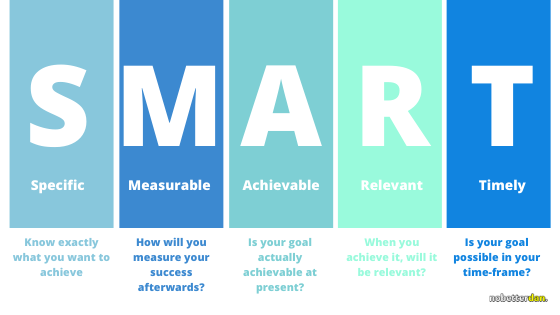Does this sound familiar to you? Completely randomly while out walking, you’re stuck with the motivation to achieve something new. Maybe it’s that you want to lose weight. It could be that you want to read more. It could be anything. And, so, you start off really positively – you’re doing it every day and then… it tapers off as suddenly as the motivation arises. Why? Well, some of it could be down to the goals themselves.
Today, we’re going to look at how you can use SMART goals to drive your motivation.
What are SMART goals?
If you’re not involved in the business world, then you may not be familiar with what SMART goals are. It dates back to 1981 and is attributed to Peter Drucker’s Management by Objectives. At its core, it is a framework to help you achieve whatever your goals are. And, of course, it’s an acronym and I’m not just randomly shouting the word “smart”. It stands for:
- Specific
- Measurable
- Achievable
- Relevant
- Timely
From the very beginning, it should be stated that not all of these will be relevant to the motivational goal that you are trying to achieve. It’s up to you to decide which ones are and what ones aren’t. I’m going to delve into each one now and layout ways that you can potentially use these towards yours.

Specific – How to get clear
One of the problems you’re likely to encounter is that you just weren’t clear enough in the goal you wanted to achieve. Sure, it’s great to say that you want to lose weight – but why? What exactly is pushing you to make this decision?
This is where being Specific kicks in. Being clear, specific, and straightforward with what you want to achieve will help cement this in your head – and also serve as a clearer reminder when you find your motivation flagging.
Let’s look at example motivational goals you may have – and then how you can change it up.
Before: “I want to lose weight”
After: “I want to lose weight as I recognize my current size is unhealthy and it poses potential health risks later in life and because it may improve my sense of self-worth. I also want to reach my target weight of…”
Before: “I want to do well in my exams”
After: “I want to study harder, do better in school, and improve the grades in my exams so that I can open up my higher-level education prospects, career opportunities, and lead what I can deem as a successful life”
Notice the difference? The before is the husk of an idea, the after is more solid, grounded, and includes the benefit that will come once you achieve your goal.
When trying to get specific, ask yourself these questions:
- What am I hoping to achieve?
- Why do I think this goal matters to me?
- How will I achieve my goal?
- What resources do I need to have in order to be successful?
Achievable – how to keep your motivational goal grounded
This is perhaps one of the most important steps. There’s no point setting yourself a goal that you simply cannot achieve – this is just setting yourself up for failure.
- Should your goal be to complete a marathon if you’ve never ran 5 KM before?
- If you don’t know how to swim, then should learning how to scuba really be what you want to accomplish?
Keep yourself grounded when you’re trying to achieve your motivational goal. Be sensible. You can work towards doing a marathon. You can start scuba diving, but just make sure you can swim first!
Relevant – Does this motivational goal matter to you?
This step is to make sure that the goal is something worthwhile to you. Is it something you actually want to do? Is it Relevant?
Let’s say that your motivational goal is to get famous for whatever reason – is this something that you actually want in your life? Do you really want that additional hassle?
Is your goal to get a promotion in your job? Then, decide if you really want the additional level of stress, the increased responsibility, and the potential change in working hours?
Making sure that the goal is relevant and worthwhile to your life will help keep you from making bad decisions, possibly wasting your time on something that did not have a positive outcome, and keep everything centered.
Timely – Give your goal a realistic timeframe
The last step in SMART goals is Timely.
If you are setting yourself a deadline for your goal, is it something you can actually achieve?
Let’s throw it back to doing a marathon – if you can barely do 5KM then is 1 month really enough time to make sure you can achieve this?
Be realistic with yourself. You can improve over time, but make sure you give yourself enough time to improve.
In conclusion
Having motivational goals is amazing! It helps you work towards something good and positive in your life. Using SMART goals will help you fight off those moments we all have when that motivation starts to fade. Keeping these clear in your head will help keep you going!

